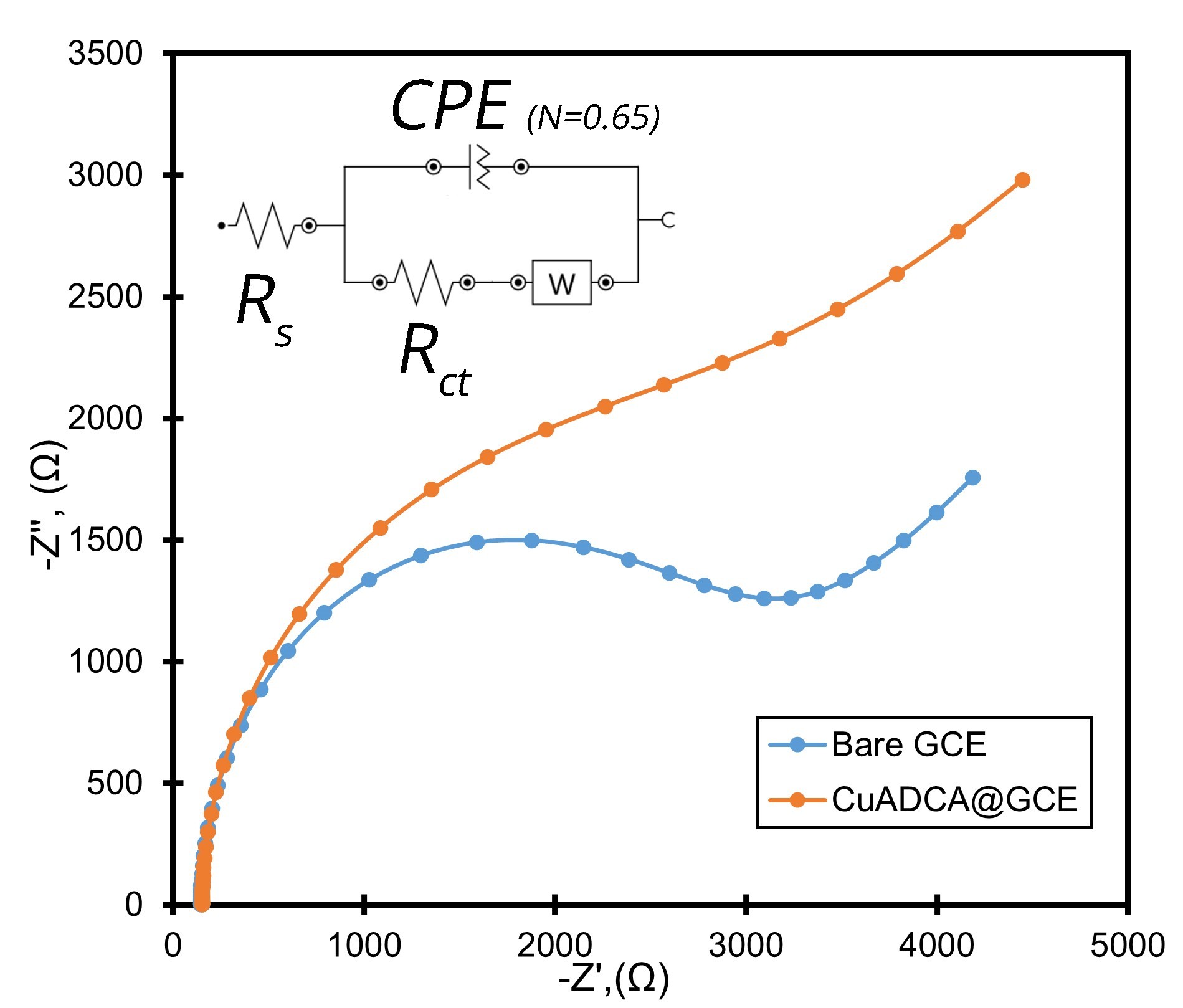
Electrochemical creatinine determination with metal-organic framework catalyst based on copper and acetylenedicarboxylic acid
Abstract
Keywords
Full Text:
PDFReferences
Yi F-Y, Chen D, Wu M-K, Han L, Jiang H-L. Chemical sensors based on metal–organic frameworks. ChemPlusChem. 2016;81(8):675–690. doi:10.1002/cplu.201600137
Mohan B, Kumar S, Kumar V, Jiao T, Sharma HK, Chen Q. Electrochemiluminescence metal-organic frameworks biosensing materials for detecting cancer biomarkers. TrAC Trends Anal Chem. 2022;157116735. doi:10.1016/j.trac.2022.116735
Chauhan S, Dahiya D, Sharma V, Khan N, Chaurasia D, Nadda AK, Varjani S, Pandey A, Bhargava PC. Advances from conventional to real time detection of heavy metal(loid)s for water monitoring: An overview of biosensing applications. Chemosphere. 2022;307136124. doi:10.1016/j.chemosphere.2022.136124
Niu Z, Liu Y, Li X, Yan K, Chen H. Electrochemical sensor for ultrasensitive detection of paraquat based on metal-organic frameworks and para-sulfonatocalix[4]arene-AuNPs composite. Chemosphere. 2022;307135570. doi:10.1016/j.chemosphere.2022.135570
Huang W, Xu Y, Wang Z, Liao K, Zhang Y, Sun Y. Dual nanozyme based on ultrathin 2D conductive MOF nanosheets intergraded with gold nanoparticles for electrochemical biosensing of H2O2 in cancer cells. Talanta. 2022;249123612. doi:10.1016/j.talanta.2022.123612
Ma J, Yuan J, Xu Y, Jiang Y, Bai W, Zheng J. Ultrasensitive electrochemical determination of bisphenol A in food samples based on a strategy for activity enhancement of enzyme: Layer-by-layer self-assembly of tyrosinase between two-dimensional porphyrin metal–organic framework nanofilms. Chem Eng J. 2022;446137001. doi:10.1016/j.cej.2022.137001
Li W, Li Y, Wen X, Teng Y, Wang J, Yang T, Li X, Li L, Wang C. Flexible Zr-MOF anchored polymer nanofiber membrane for efficient removal of creatinine in uremic toxins. J Membr Sci. 2022;648120369. doi:10.1016/j.memsci.2022.120369
Wu N, Guo H, Peng L, Chen Y, Sun L, Liu Y, Wei X, Yang W. Three-step post-synthetic modification metal-organic framework as a ratiometric fluorescent probe for the detection of creatinine. Microporous Mesoporous Mater. 2022;338111989. doi:10.1016/j.micromeso.2022.111989
Luo L, Xie Y, Hou S-L, Ma Y, Zhao B. Recyclable luminescent sensor for detecting creatinine based on a lanthanide–organic framework. Inorg Chem. 2022;61(26):9990–9996. doi:10.1021/acs.inorgchem.2c00850
Ma B, Guo H, Wang M, Li L, Jia X, Chen H, Xue R, Yang W. Electrocatalysis of Cu−MOF/graphene composite and its sensing application for electrochemical simultaneous determination of dopamine and paracetamol. Electroana. 2019;31(6):1002–1008. doi:10.1002/elan.201800890
Campbell MG, Sheberla D, Liu SF, Swager TM, Dincă M. Cu3(hexaiminotriphenylene)2: an electrically conductive 2D metal–organic framework for chemiresistive sensing. Angew Chem Int Ed. 2015;54(14):4349–4352. doi:10.1002/anie.201411854
Stassen I, Burtch N, Talin A, Falcaro P, Allendorf M, Ameloot R. An updated roadmap for the integration of metal–organic frameworks with electronic devices and chemical sensors. Chem Soc Rev. 2017;46(11):3185–3241. doi:10.1039/C7CS00122C
Mitewa M. Coordination properties of the bioligands creatinine and creatine in various reaction media. Coord Chem Rev. 1995;1401–25. doi:10.1016/0010-8545(94)01122-R
Ntep TJMM, Gramm VK, Ruschewitz U, Janiak C. Acetylenedicarboxylate as a linker in the engineering of coordination polymers and metal–organic frameworks: challenges and potential. Chem Commun. 2022;58(64):8900–8933. doi:10.1039/D2CC02665A
Xu W, Pan W-J, Zheng Y-Q. Syntheses and crystal structures of phthalato-, succinato-, maleato-, acetylenedicarboxylato-bridged [bis(2-pyridylcarbonyl)amide]copper(II) complexes. J Coord Chem. 2013;66(24):4415–4429. doi:10.1080/00958972.2013.862789
Shershnev VA, Shilov GV, Dzhardimalieva GI, Pomogailo AD, Izydorzak M, Leonowicz M. Synthesis and characteristics of acetylenedicarboxylic acid salts as precursors for obtaining of nanocomposites. Macromol Symp. 2012;317–318(1):180–186. doi:10.1002/masy.201100131
Sriramprabha R, Sekar M, Revathi R, Viswanathan C, Wilson J. Fe2O3/polyaniline supramolecular nanocomposite: A receptor free sensor platform for the quantitative determination of serum creatinine. Anal Chim Acta. 2020;1137103–1137114. doi:10.1016/j.aca.2020.09.004
Boobphahom S, Ruecha N, Rodthongkum N, Chailapakul O, Remcho VT. A copper oxide-ionic liquid/reduced graphene oxide composite sensor enabled by digital dispensing: Non-enzymatic paper-based microfluidic determination of creatinine in human blood serum. Anal Chim Acta. 2019;1083110–1083118. doi:10.1016/j.aca.2019.07.029
Fava EL, Prado TM do, Garcia-Filho A, Silva TA, Cincotto FH, Cruz de Moraes F, Faria RC, Fatibello-Filho O. Non-enzymatic electrochemical determination of creatinine using a novel screen-printed microcell. Talanta. 2020;207120277. doi:10.1016/j.talanta.2019.120277
DOI: https://doi.org/10.15826/chimtech.2023.10.2.01
Copyright (c) 2023 Andrei V. Okhokhonin, Alsu A. Ibatullina, Yulia V. Izmozherova, Marina I. Stepanova, Anatoliy I. Matern, Alisa N. Kozitsina

This work is licensed under a Creative Commons Attribution 4.0 International License.
Chimica Techno Acta, 2014–2025
eISSN 2411-1414
Copyright Notice







